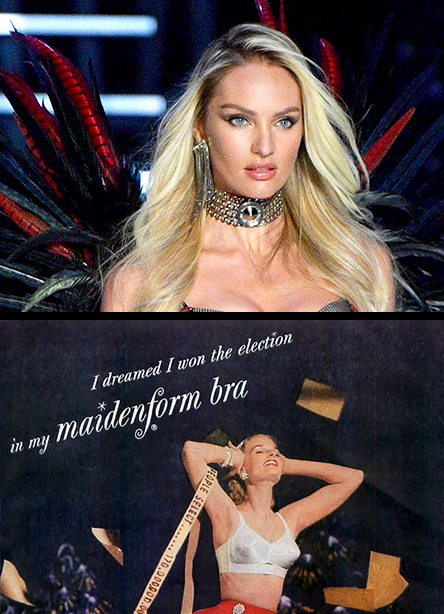(Warning: This blog contains mature content)
In the late 1950s, the William Weintraub ad agency came up with an indelibly memorable and controversial campaign for Maidenform. The “I dreamed” campaign featured amply endowed women wearing nothing but their bras in a series of dream sequences that ran the gamut from bullfighting and trying a case in court to floating down the Nile like Cleopatra. Imagine flipping through Life magazine and coming across those ads. To say they were titillating is, well, literally correct.

While Maidenform’s official spin was to position the campaign as encouraging women’s empowerment, in 1950s America these professional options were mostly out of their reach. They did, however, give sales a major uplift (couldn’t resist). They also reminded women that the best way to get a job or a promotion was to have perky Maidenform contours.
In the late 1970s, Roy Raymond, frustrated that he felt uncomfortable buying lingerie for his wife at department stores, founded Victoria’s Secret. His efforts were hugely successful and in 1977, he added the Victoria’s Secret catalog to his sales arsenal. Hmm, pages and pages of overflowing cleavage delivered right to your door? Suffice to say, it became one of the fastest-growing mail order businesses in the U.S. In 2001, they took to the network airways with the Victoria’s Secret Fashion Show. A teaser ran during the Super Bowl – the obvious choice for a purported female audience. The FTC was bombarded with hundreds of complaints and it got a thumbs-down from NOW (National Organization for Women), who labeled it a “soft-core porn infomercial.”
Are you sensing a pattern here? Well, hold onto your underwires, because in a new ad campaign, Lunya, an upscale lingerie company started five years ago by Ashley Merrill, has a message for all women and it’s not subtle. A full-page ad in The New York Times, OOH ads in New York and San Francisco and a giant mural on the company’s headquarters show a close-up of a woman in the process of lowering her ladies boxer’s waistline below her navel with a simple, three-word headline: “I come first.”
There is no mention about how their garments look, wash and feel. And that’s because the campaign is not about their gorgeous line of nightwear and lingerie. They are championing women’s sexual satisfaction and deeming it wanting. In short, their campaign is about women’s orgasms or lack thereof.
Call it a natural progression stemming from the Me Too movement or a concept that just feels right in 2019 with women gaining a huge foothold in the political arena, but they’re onto something. Let’s see if their bold efforts turn into ROI. Because at the end of the day, profits come first.

